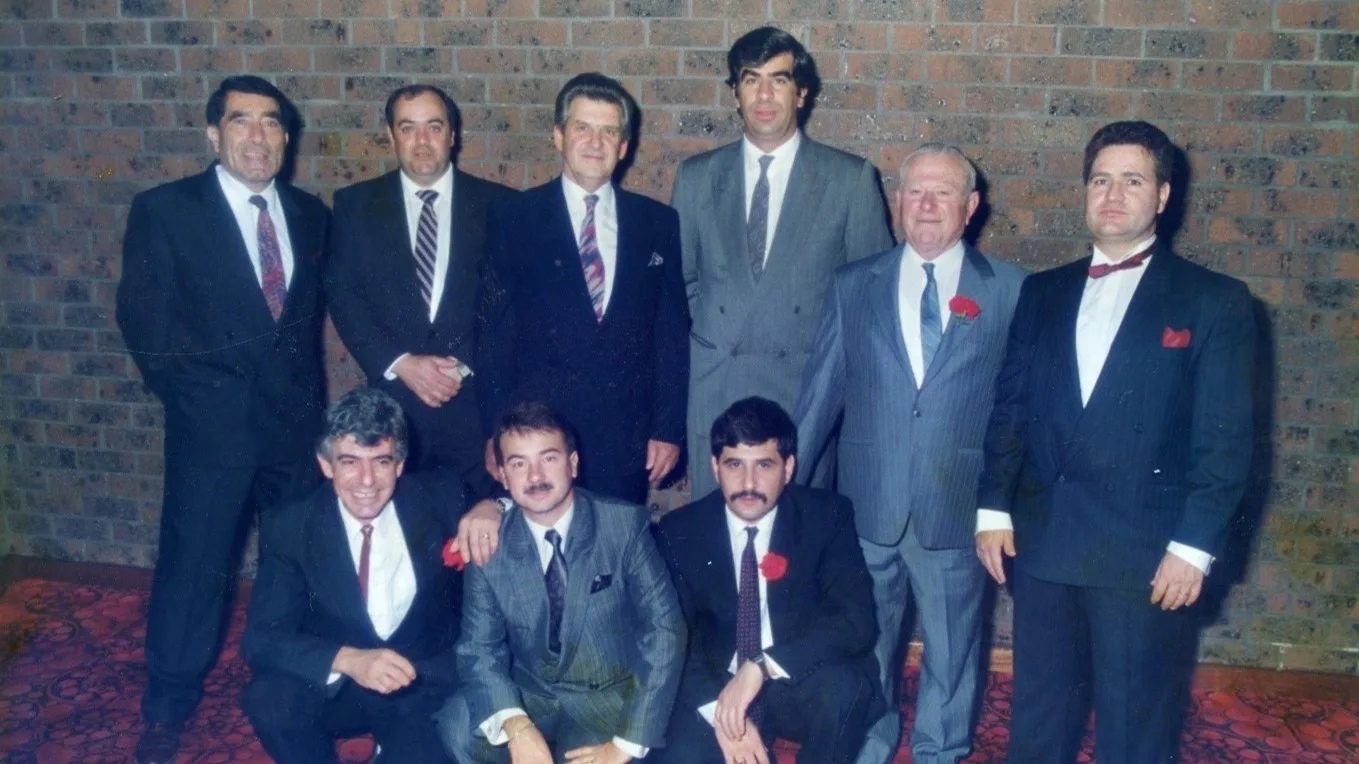The passing of Panagiotis (Peter) Yiannoudes marks the fulfilment of the Last Oracle of Apollo’s high priestess, Pythia, who had foretold the death of the ancient Greek world with the rise of Christianity. In 362 AD, Pythia informed the appointed physician of Emperor Julian the Apostate that no longer were there courtyards in Delphi, nor Apollo, nor prophetic oracles, nor laurels, nor a spring with prophetic waters, thus proclaiming the “it is finished” for the Greek world. For the Greek diaspora and the Greek communities in Australia, Yiannoudes’ death symbolises the fulfilment of a similar Last Oracle, as known over the past seventy years.
For over seventy years, pioneering Greek immigrants have supported Greek traditions and customs through their struggles, building their churches, establishing schools, organising social welfare centres, care homes, geriatric clinics, and nurseries. Most importantly, they built bridges of continuous and systematic communication with Greece and its people on issues concerning our common homeland, the so-called national issues. For seventy years, they fought for Northern Epirus, Macedonia, Cyprus, and the Aegean, bonding emotionally through struggles, strikes, protests, and clashes with Greece’s and Greeks’ enemies. The 270,000 Greek settlers who emigrated built the old world of Greece in Australia and across the diaspora. They nurtured bonds of trust in Greece with their children, taught them to love and care for Greece, and instilled in them a sense of Greek identity while living abroad.
For seventy years, during their lifetimes, Greeks cherished the world they brought with them from Greece, from every corner of the country. They sought to teach their children the traditions, dances, music, language, and faith of their heritage. This Hellenic world, Greek in style and spirit, is now fading over the next ten to fifteen years, just as it faded for Emperor Julian, leaving only an emotional bond with Greece and the Greeks for their children and grandchildren. What will endure is the memory of the fighters and visionaries like P. Yiannoudes, reminding future generations and the unborn of the duty of the elders, the brilliance of the tireless and uncompromising patriotism of the early immigrants, of the world that is passing and has passed in relation to their homeland.
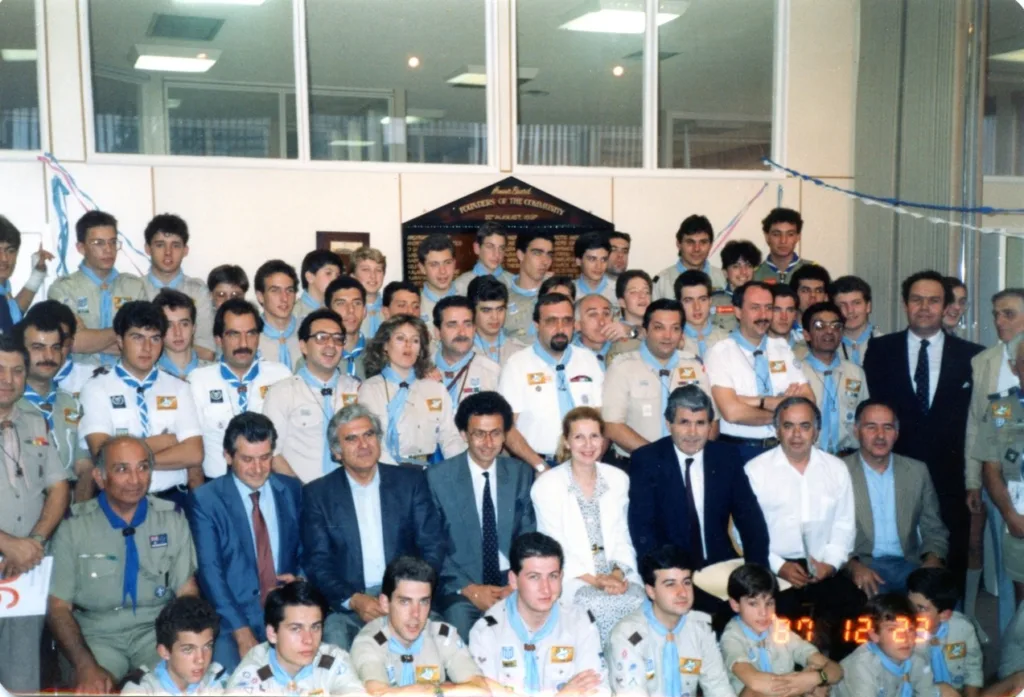
Yiannoudes was among the last formidable patriots in whose veins the Hellenic world of Greece and Cyprus bled. He was one of the most active and indomitable warriors for our national issues, a Greek of the diaspora who taught Greeks in Greece and its institutions abroad that despite the challenges, opposition, unnecessary persecution, and devaluation, Greeks in the diaspora remain on guard until the end, learning to forgive and love those who have wronged and still wrong them. For within them resides not only love for their homeland but also a duty to the immense legacy that Greeks have borne upon their shoulders for four thousand years.
As a tribute to the immense contributions of P. Yiannoudes to all of us, I would like to recall a few examples of his steadfast dedication from my work on the history of Cypriots in Australia, a project to which his assistance was exceptionally generous.
One of the most significant Cypriot leaders in the global Greek diaspora was undoubtedly the industrious entrepreneur P. Yiannoudes, who first served as organisational secretary from 1972 under T. Toubourou. Mr Yiannoudes (2 February 1935 – 5 November 2024) was born in Vouni, a small village in the district of Limassol, into a family of small farmers. His parents were Michael (1898–1982) and Irene Theodorou (1906–1996), and his siblings were Adelaoniki, Athina, Antonios, and Theodora. He attended the local primary school, and in 1948 moved to Limassol, where he enrolled at Laniteio Gymnasium. During his time in Limassol, he shared a house with other border guards and worked selling English-language newspapers to British soldiers.
From 1951, he occasionally worked weekends as a cashier in outdoor cinemas and trained as an athletics competitor with the Limassol Gymnastics Association. After graduating from secondary school and working briefly as a lithographer and bookbinder, he accepted an invitation in 1956 from his sister Adelaoniki, who had emigrated to Australia two years earlier. He travelled via Air India from Beirut, spending five days (2-7 July 1956) journeying only during the daytime with stops in Tehran, Bombay, Madras, Singapore, and Darwin. Also on the flight were fifteen young Greek immigrants, including the Spartan Georgios Fountas, who later became a long-standing president of GOCMV. Yiannoudes was welcomed by his sister Niki and brother-in-law Christodoulos Protopapas and stayed briefly with them in Fitzroy. He initially worked in a clothing factory before joining the Hoyts cinema industry.
Soon after, he became an athlete for the Collingwood Harriers Athletic Club. As an athlete, he competed in various races, and in December 1956, he represented Melbourne at the first Panhellenic Games in Sydney, where he finished second in both the 800 metres and 1500 metres events. During the Melbourne Olympics in November 1956, Panagiotis-Petros joined the Greek team as a volunteer. During the day, he worked for a clothing manufacturing company, and at night, he attended Taylors College, studying Business Administration to improve his education. He also worked as an assistant projectionist at Hoyts Cinemas in Melbourne, which included the Plaza on Collins Street and the Padua Cinema in Brunswick.
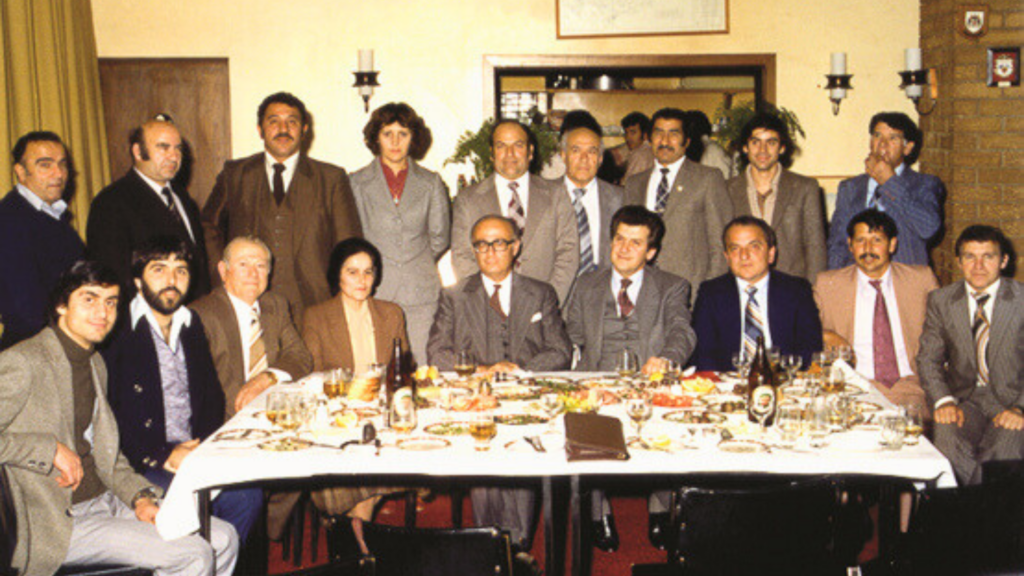
In 1957, he managed to become a representative of one of Greece’s most prestigious film companies, Finos Film, and established a profitable partnership with its producer and founder, Filippos Finos. In December 1957, he brought the most popular romantic film, titled Golpho, to Australia. The film was first screened at Melbourne Town Hall in front of an audience of 2,521 spectators. This was the largest crowd of Greeks ever gathered during this phase of Greek immigration. Following the huge success and the inspired reviews in the Greek media, Yiannoudes toured the entire continent, visiting over 150 rural and urban cities, villages, towns, as well as community halls, farms, homes, and large restaurants screening Golpho.
From the rented large, spacious cinemas to the underground galleries of Coober Pedy, from the drive-in cinemas in the vast inland of Western Australia, spanning all the way from Albany in the south to Broome and Derby in the north, and the sugarcane farms of far northern Queensland to the desert municipalities of central Australia, this young transient promoter of Golpho became well-known among all Greeks and Cypriots, amassing a fortune that allowed him to pursue a successful career in the film industry. There was a high demand for Greek films, as very little entertainment was available to the migrants arriving in Australia. By this time, around four or five different people were screening Greek films every Saturday in some church halls.
In 1958, Peter partnered with Andreas Papadopoulos and Stathis Raftopoulos to establish a film company called Cosmopolitan Motion Pictures Pty. Ltd. This company became one of the main distributors of films in Australia and New Zealand, and soon, together with Chris Louis from Sydney, they became the only Greek, Turkish, Indian, and Yugoslav film distributors in Australia. They also distributed other international, English, and American films. Over the following years, Cosmopolitan Motion Pictures acquired eight cinemas in Melbourne, two in Adelaide, and one in Perth, and leased cinemas in various regional towns.
Between 1960 and 1975, the Greek community experienced a massive influx of Greek immigrants to Australia, and businesses flourished. Cosmopolitan Motion Pictures also organised tours for theatre troupes, popular singers, artists, and wrestlers, including Jim Londos and Primo Carnera (1958), and Haris Karpozilos (1960). The pinnacle of this was the organisation, in the early 1970s, of concerts for Mikis Theodorakis and his band in Australia, which were extremely successful. The then Prime Minister and philhellene Gough Whitlam attended two of these concerts in Sydney and Brisbane.
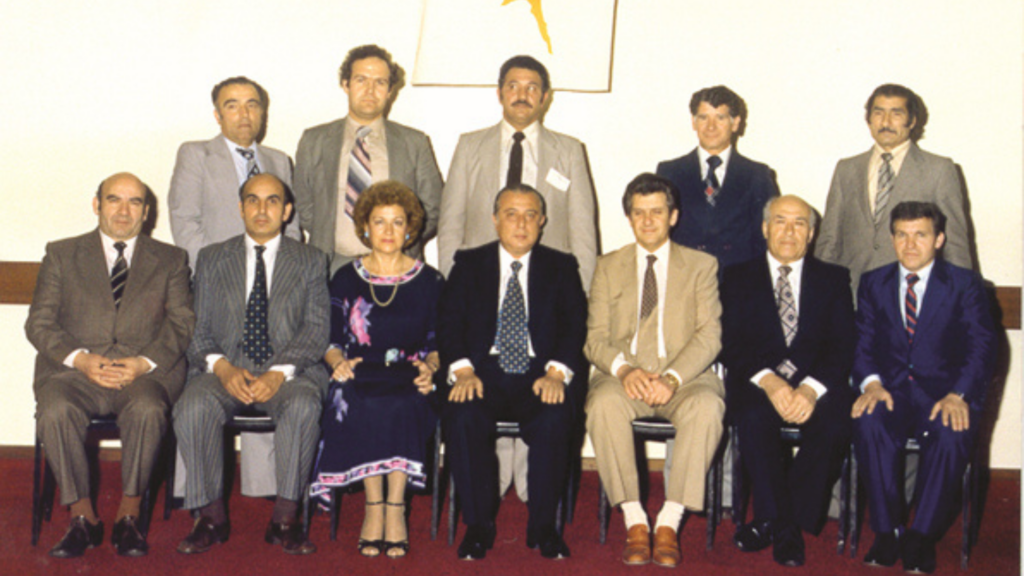
In the mid-1960s, he was one of the pioneers in founding the first Greek-Australian Chamber of Commerce in Melbourne, and given that he owned and operated more than eleven cinemas in Melbourne, Adelaide, Perth, and other cities, his presence in the community was vital and significant. In 1972, Yiannoudes joined both AHEPA (Australasian Hellenic Educational Progressive Association) and CCMV.
In 1972, Yiannoudes became a member of the Executive Committee of the Cypriot Community of Melbourne and Victoria, serving as the organisational secretary. Unfortunately, 1974 marked a tragic moment for Cyprus with the Turkish invasion. He became involved in providing aid to refugees under difficult circumstances, travelling to Cyprus 3-4 times a year. In 1979, he was elected President of the Cypriot Community of Melbourne and Victoria, a position he held until 1990. During his presidency, he organised the first Cypriot Wine Festival in 1982, the first Cypriot Senior Citizens Club in 1990, and several other celebratory events.
In 1978, the Yiannoudes also became President of the Federation of Cypriot Communities of Australia, a role he held until 1996. Additionally, in 1978, he was appointed Vice-President of POMAK (The Organisation of Overseas Cypriots), serving in this position until 1996, and from 1996 to 2003, he served as General Secretary of the World Organisation of Cypriots. From 1977 to 2003, he was also the President of the Justice for Cyprus Committee (SEKA).
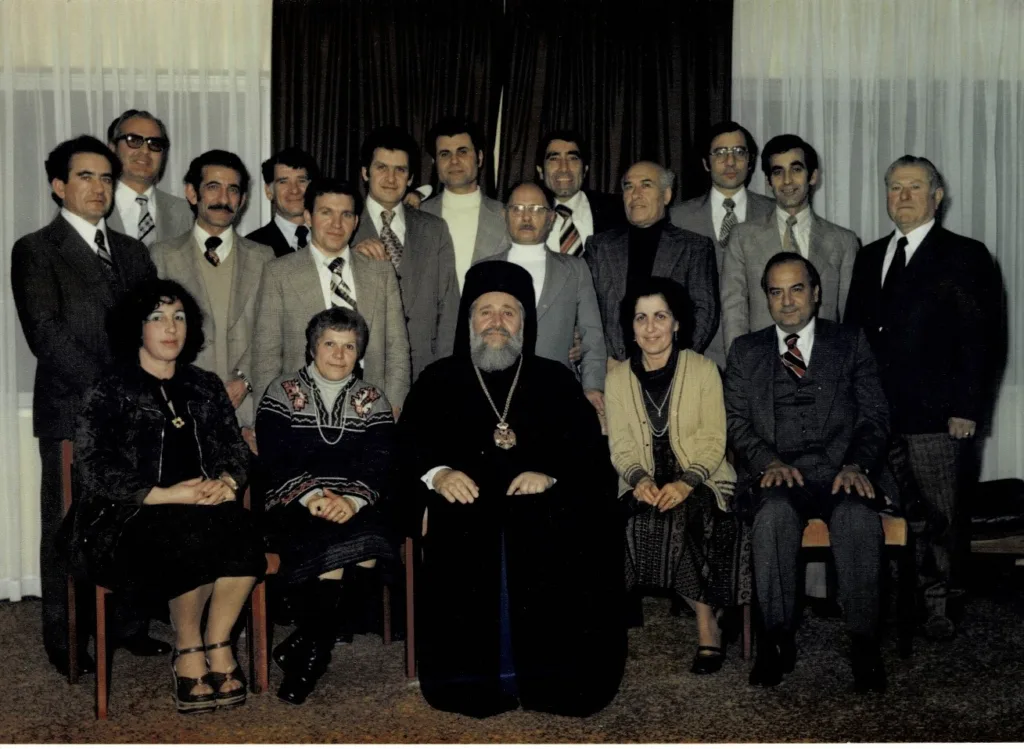
Meanwhile, on July 17, 1960, Yiannoudes met and married Katerina Katopodi (born 11.1.1937) at the Evangelismos Church. Her father, Andreas, a skilled tailor who ran his business from a shop on Swanston Street, had settled in Melbourne in 1920 from the island of Lefkada. Her mother, Maria Rosvoglou, was the daughter of Minorasian refugees from Cesme, who had settled in Melbourne in 1924.
Yiannoudes and Katerina had three children: Marilyn (born 25.12.1961), a microbiologist who married George Souvozika and raised Konstantinos and Aikaterini; Michalis (born 16.9.1963), an electronics engineer who married Paschalina Liaskou and had two daughters, Athena and Panagiota; and finally, Irene (born 1.12.1972), a teacher who raised two children, Athanasios and Aikaterini.
Yiannoudes was the living embodiment of Cypriot Hellenism. Hundreds of instances testify to his energy and passion for giving and humanitarianism. After returning from his visit to Cyprus with Charis Siamaris and Kostas Zintylis, Giannoudis and his companions made the Cypriot tragedy the central issue of national reconciliation and discussion in all newspapers and radio stations, with strong emotional appeals and pleas from Cypriot and Greek leaders, engaging the public’s sense of honour.
There was also a campaign by PEVAK and CCMV to support the arrival of at least 9,000 Greek Cypriot refugees in Victoria and Australia and to initiate a campaign to monitor and locate the missing national martyrs. Their fate and well-being in Australia served as a powerful stimulus for the upcoming boards over the next forty years, strengthening feelings of solidarity and national pride among the Greek community.
During the period from 1974 to 1978, over 2,000,000 dollars in aid were delivered to the Refugee Assistance and Rehabilitation Service under the leadership of its founder, Georgios Iakovou, with more than 100 tonnes of food and supplies being airlifted in collaboration with the Commonwealth Government. During this time, Yiannoudes and his colleagues at Cosmopolitan Motion Pictures, Stathis Raftopoulos (1921-2003) and Andreas Papadopoulos (1913-1988), along with former President of the Cypriot Community of Sydney (1961-1963) and businessman Chris Louis in Sydney, offered their enthusiastic support for the Cyprus refugee appeal programme in Australia. They made all their cinemas available for screenings, concerts, and public meetings to support the refugees.
Additionally, Yiannoudes and the Cypriot leaders of the CCMV, in collaboration with PEVAK, organised successive welcome events for the incoming refugees, including tea receptions to raise funds, social dances, and appeals. On 21st July 1977, Yiannoudes met with President Makarios in Limassol and agreed to distribute a film in Australia and New Zealand, directed by Evangelos Ioannidis, titled Makarios – The Long Journey, with all proceeds going to the Makarios Charitable Fund.
“Unfortunately, for Cyprus, a few days later, Archbishop Makarios passed away. I attended his funeral, and it was the least I could do. His successor, Archbishop Chrysostomos, later asked me to personally oversee the screening of the film in Australia. He even visited Australia, and the proceeds from the film were donated Australia-wide to the Archbishop’s Fund in Cyprus.” This universal cooperation in support of the hundreds of thousands of refugees was justified.
It was estimated that 40% of the Greek Cypriot population, as well as over half of the Turkish Cypriot population, were displaced by the Turkish invasion. Figures for internally displaced Cypriots vary: the United Nations Peacekeeping Force in Cyprus (UNFICYP) estimated 165,000 Greek Cypriots and 45,000 Turkish Cypriots. The UNHCR reports slightly higher numbers, 200,000 and 65,000, respectively, partly based on official Cypriot statistics that record children of displaced families as refugees. On 2nd August 1975, both sides reached the Vienna agreement on voluntary population exchange, which was implemented under the auspices of the United Nations. Under this agreement, Turkish Cypriots who remained in the south were moved to the north, and Greek Cypriots who remained in the north were moved to the south, except for a few hundred Greek Cypriots who chose to stay in the north.
The illegal invasion and occupation of Cyprus remained the true primary goal for Yiannoudes. He continuously set plans for a just resolution, also expressing the disgust of his compatriots on both a national and international level. Nearly fifty years later, he recalled those days of the invasion, as well as the higher spirit of emotional uplift and solidarity among the Greeks of Australia:
More than seventy women, during the previous months after our return, used to gather at the Saint Demetrios Church Hall in Prahran, while thousands of people brought food, clothes, and other material resources for the refugees in Cyprus. I remember with great emotion the faces of these devoted ladies, who would take the clothes home, wash them, iron them, and then bring them back to be placed in boxes. There were those towering figures, God bless them, who were constantly there every day, working as volunteers for many hours. Among them were Katerina Giallouri, Olga Papadaki, Yiouli Lazarou, Papaloukas, P. Zintilis, to name just a few. We managed to collect over a million dollars in just a few months in Melbourne alone. We entrusted the money to George Iakovou and his humanitarian organization, the Displaced Persons Relief and Rehabilitation Service.
I remember the charismatic and generous Lefkios Papadopoulos, a capable travel agent and loyal member of successive Executive Committees. He, along with the Hermes travel agency, even convinced the management of QANTAS to fund our efforts. He secured the donation of 1,000 kilos of clothing to be transported weekly from Melbourne to Athens. The goods were then sent to Larnaca to meet the needs of the refugees. Another travel agent, Fotis Iosifidis, would donate round-trip air tickets to Greece for our fundraising campaigns, encouraging people to buy lottery tickets to support the cause. Retail businesses of the Greek Australian community donated their products to the refugee appeal. There were continuous reminders in the Greek Orthodox churches and schools. This generosity continued for many years. I also recall that Graecian Tours, operating from Lonsdale Street, contributed to the offering of many round-trip air tickets for the Cyprus cause, especially after 1981, when Olympic Airlines made Australia its home. This had the unanimous support of all the partners involved in Graecian Tours, namely Lefkios Papadopoulos, George Fountas, Savvas Papasavvas, Antonios Tombourou, George Nikolaou, and myself.
